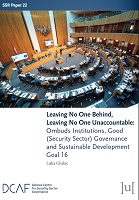Leaving No One Behind, Leaving No One Unaccountable
Ombuds Institutions, Good (Security Sector) Governance and Sustainable Development Goal 16
Abstract
How does the nexus between security, human rights and good governance play out in the sustainable development context? Based on state-of-the-field, interdisciplinary research with a global perspective, Leaving no one behind, leaving no one unaccountable offers the first comprehensive account of the role of ombuds institutions in achieving the Sustainable Development Goals, launched by the United Nations in 2015. With their unique position in-between three branches of power, the mandate to oversee public administration (including the security sector) and protect human rights, ombuds institutions are well-placed to play an important role in national efforts to fulfil the SDGs. The book takes the specific angle by looking at SDG-16, devoted to effective, accountable and inclusive institutions, through the lens of security sector governance.
It brings granular analysis of all SDG 16 targets, demonstrating how ombuds institutions could contribute to achieving each of them. The book develops an innovative conceptual framework, by looking at both implementation and accountability. The former is captured under the title of ‘leaving no one behind’ and the latter under ‘leaving no one unaccountable’. Leaving no one behind is a central credo of the 2030 Agenda. It is highly relevant for SDG-16, as well as security sector governance, due to the centrality of the principles of responsiveness, inclusiveness and participation.
The book attests that for a number of the SDG 16 targets, ombuds institutions should primarily serve as accountability mechanisms. It argues they should work with, pressure, and make public administration accountable, in cases when the administration as the primary duty-bearer fails to protect the rights of citizens and when their actions fall short of the standards needed to achieve the SDGs.
As this book demonstrates, many SDG 16 targets are rather vague, and limited guidance exists on how to measure and achieve them, especially in fragile contexts. It thus provides guidance and recommendations to ombuds institutions and other actors on how to best support each other in achieving SDG-16. Leaving no one behind, leaving no one unaccountable is a key resource for scholars, policymakers and activists concerned with effective, accountable and inclusive institutions, and those interested in political science, security studies, human rights and development studies.


 Download
Download Web Shop
Web Shop